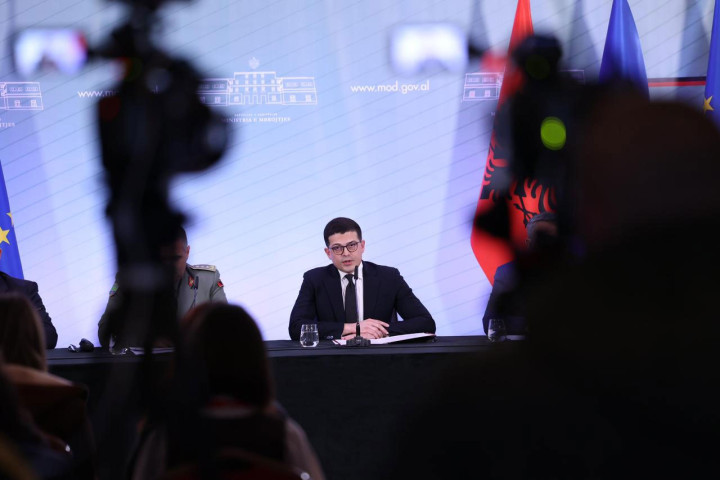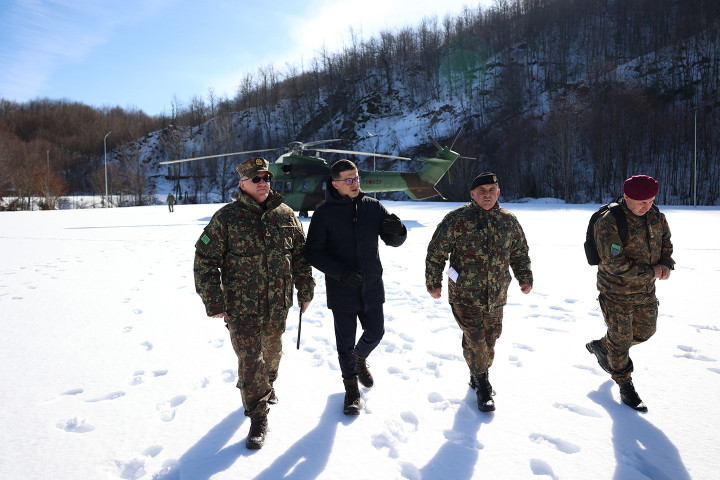Ministrer’s Kodheli lecture at the German Defence Academy of Armed Forces in Hamburg
-
Published: Wednesday, 11 May 2016 13:47
Minister Kodheli has started her tow day visit in Germany by giving a lesson to the students expected to graduate this academic year, at the German Defence Academy of German Armed Forces in Hamburg. At first, Minister Kodheli had a welcoming meeting by the commander of academy, General Achim Lidsba.
During the meeting with the Major General Lidsba, minister Kodheli expressed that is honored for being given this rare opportunity to deliver a speech to the students of this academy.
Minister Kodheli praised the high level of their studies and stated her gratitude to the commander of academy for the close cooperation that has just begun between this academy and the Albanian Ministry of Defense.
Furthermore Minister Kodheli, on behalf of the Albanian government thanked General Major Achim Lidsba for his contribution during the Kosovo war.
Below you find the full speech of Minister’s Kodheli lecture at Military Academy of the German Armed Forces in Hamburg
Good evening to everyone
It is an impressive moment for me, being here amongst such a prestigious institution like the Fyhrungs Akademie of the Bundeswehr. Thousands of smart, ambitious, intellectual and motivated people have passed through this Lecture Hall. So, General Lidsba, I will try to give my best to match the motivation that your prestigious institution gives to all alumni and beyond. In Albania, there is a solid presence of officers that have gone through this Academy; two of them are accompanying me today.
When I was checking the agenda of the event, I realized that this lecture hall bears the name of Manfred Woerner, an important name for the politics of the late eighties and early nighties. An important name also for us, living behind the Iron Curtain. A man that held the office of the NATO’s Secretary General for six important years that shaped the future of post-communist Europe. A man that started negotiating peace in Bosnia and Herzegovina, calling for the use of NATO forces in 1994.
And I come from that specific region, what it used to be called Balkans, the powder keg of Europe. During the last 25 years, many European politicians have tried to rebrand the region I come from. A considerable part of it has become part of the European Union, but it still remains the less developed part of our old continent, now called the Western Balkans.
I see amongst you many uniforms from armed forces of allied and partner countries. Most of you know quite well the problems of the region where I come from. So, I am not here to define or give to you my version of the history of the Western Balkan, but to talk about the present and future of my region.
I would like to draw your attention specifically on a current issue. How do the current conflicts in Ukraine and the Middle East influence on the Western Balkans? What is the international community doing to respond to any potential attack, that can be caused by what is called "the powder keg" of Europe?
We are living in not so bright days. All of us! The economic crisis was followed by the escalation of the conflict in Ukraine, the rise of DAESH and the waves of the refugees coming all way up from the Middle East, here, in Germany or elsewhere around Europe. Who predicted or envisioned any of these three years ago? History is not written in advance. But we can prevent an age of disorder – if we have the will. We can keep the international order that has served us so well, if we stand up for its rules and if we stand up for each other. So, everything depends on us.
NATO member countries are recently facing various threats coming from the East and South, but having in common the principles of collective defense, crisis management and cooperative security. Concerns across the Eastern and South-eastern flanks of the Alliance are obvious.
We must not forget the regions that can easily be affected by the international turmoil, due to their instability and vulnerability. Western Balkans is one of them, relatively far from Russia and the Middle East, but largely influenced by the money and ideology of Moscow and fundamentalism.
The best examples of the region are Slovenia and Croatia, NATO and EU member countries. Albania is only a NATO member country while Montenegro is the next member of the Alliance. The other countries are candidates for EU and NATO accession, based on different schedules and agendas, name and democracy issues (like Macedonia) or centrifugal forces that shake the foundations of fragile democracies (like BiH). Some even prefer only the European Union and avoid any connection with NATO (Serbia). Meanwhile, Kosovo is making great progress toward its recognition and integration in international organizations.
The way towards EU membership is more complex for Western Balkan, and so it is for my own country. Political uncertainties and economic restrictions are weakening the dream of integration, and in times of such conflicts, we all agree that other conflicts can be easily prevented by integration processes.
With the rise of nationalism in Europe, Russia has had a clear and concrete project for the Balkans, clearly determining influence points based on religion and racial descent. Our region is always seen as a supplement to the expansion of Russia towards the Mediterranean. Dreams of Western civilization of the Balkans have never been accepted by Russia.
Nowadays, banks, businesses, tourist infrastructure, gas and fuel companies in the Western Balkans, are targeted by Russia’s money. Russia's economic presence is growing steadily in these times of difficulty for the West. We are not against good economic relations between countries, but there are political forces in many countries of the region which see the Russian way of thinking as the best option for the future of their countries. In some countries, such political parties look ridiculous, but elsewhere, in the heart of the Balkans, they represent a significant part of the population. Moreover, the number of these people from the Balkans participating in the Russian hybrid warfare is obvious and disturbing.
Hundreds of millions of rubles invested in the region, joint military exercises with Russian troops near NATO countries borders, pose a great concern and cause a huge controversy, in my viewpoint.
On the other hand, the jihadists seek fertile ground in Europe. The terrorist attacks in France and Belgium, are alarm bells for the risk coming from the forces of darkness that modern civilization is facing today.
There are our citizens who are participating in the ranks of DAESH, as foreign fighters. Mostly young people from all over Europe have been contaminated by the dangerous evil interpretation of a peaceful religion like Islam, becoming savage beasts with no mind, heart or soul.
We see and face their evilness every day, through their acts based on a violent ideology of hate and terror. And we need to give hope to our citizens, by dealing in our best democratic practices with those young men who are killing people and hope every day.
What NATO and the EU have done in the last 20-25 years is wonderful. Nevertheless, is it so drastic for the EU to accept several million people from Albania, Bosnia, Kosovo, Macedonia, Montenegro and Serbia as its own citizens? No one is asking for gifts and privileges, but how about having a secure region?
Waves of refugees are crossing through the Western Balkans, heading for Germany and Northern Europe. They are bringing with them many of the problems they face, but they are also making us show most of the problems we have. As a politician, mother, daughter, wife, sister, feminist, socialist, I cannot accept the way refugees are being managed in my region. And also I don’t accept the political mix-up of refugees and migrants that are moving towards the Western Europe.
My personal interpretation of the 2014 Berlin Summit was that EU "has not forgotten the Western Balkans". This was a powerful incentive meeting but that may not be enough if the EU wants our countries to be prosperous member states one day. I believe EU remains faithful to the "European perspective" promised to the Western Balkans. However, leaving all the responsibility to these countries, results in losing the larger view of a disinterested EU, which has no desire to break the net that has left behind the societies in this region.
The same argument is valid for the regional integration into NATO. Of course NATO’s path is clearer and everyone knows the homework needs to be done. But NATO must not forget that these dark forces coming from the East and the South want to stab the Alliance on the back. The weakest point is close, somewhere between Albania, Croatia, Hungary and Bulgaria, all being NATO member countries that share borders with non-member countries of NATO.
NATO has made important decisions to ensure an alert and strong Alliance including the intensification of the cooperation among partners by initiating the development of the Defense capacity, to help the Alliance project stability with a clear presence
The open-door policy was repeated and now we are expecting the 29th member of the Alliance. Montenegro is the newly welcomed member and we are all excited to see the final act of their membership to NATO. I hope this will happen for the other countries of the region that share the same principles and democratic values.
Once again, it is obvious that we are trying to narrow the spaces in the areas mentioned above. Taking into consideration the significance of the security environment today, we have to move faster. I firmly believe that the integration of this grey zone of Europe into the Euro-Atlantic community will make our alliance a better group of countries with common values for collective protection.
We all share the same European values and have the same objectives for the future. With more political will, the eastern and southern conflicts will stay far away from the Balkans.
All measures taken by NATO until now have a defensive nature, are proportional and in accordance with the international principles and commitments. This is the Alliance's response to potential risks and threats, from the east and the south.
Taking into account the current crisis and uncertainties, we must remember that peace and stability in our region cannot be taken for granted. History has taught us that as the world changes, NATO, EU and the entire international community need to change. They must be able to quickly react not only politically, but also to have the appropriate and necessary capacity.
I grew up listening to Simon and Garfunkel, an American folk rock duo of the sixties. I am not sure how many of you in this lecture hall remember these artists, but I am sure General Lidsba does. And one particular song title of Simon and Garfunkel, “Bridge Over Troubled Water” is exactly what I have in mind when I talk about integrating the Western Balkans into the big Euro-Atlantic family.
I hope I gave enough points for challenging questions, which I am very happy to receive and I will do my best to give my most sincere answers to all of them. Thank you!
Articles from Newsroom
Monday, 26 January 2026



Defence Minister Vengu hosts Belgian counterpart: Cooperation to strengthen our capabilities
Tuesday, 20 January 2026
Albanian Air force trains with the U.S. Air Force, focusing on rapid crisis response
Monday, 19 January 2026